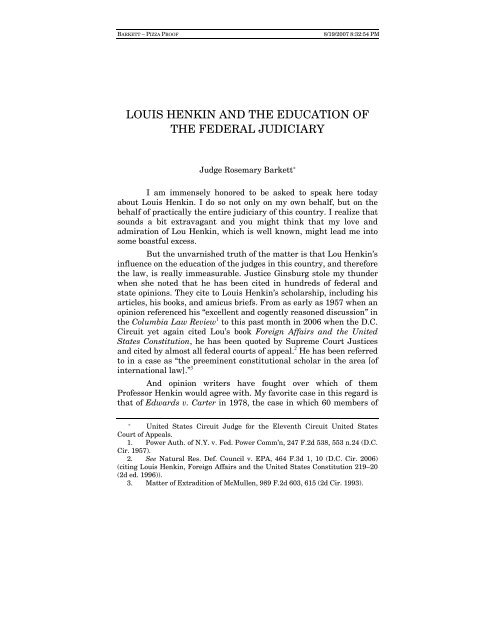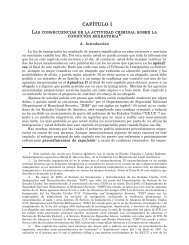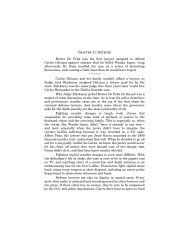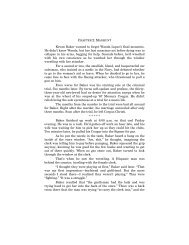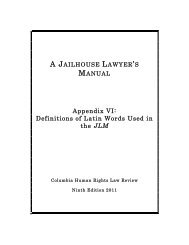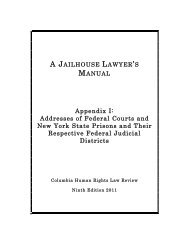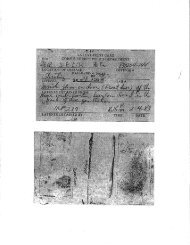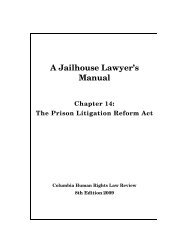Judge Rosemary Barkett Final.pdf - Columbia Law School
Judge Rosemary Barkett Final.pdf - Columbia Law School
Judge Rosemary Barkett Final.pdf - Columbia Law School
Create successful ePaper yourself
Turn your PDF publications into a flip-book with our unique Google optimized e-Paper software.
BARKETT – PIZZA PROOF 8/19/2007 8:32:54 PM<br />
LOUIS HENKIN AND THE EDUCATION OF<br />
THE FEDERAL JUDICIARY<br />
<strong>Judge</strong> <strong>Rosemary</strong> <strong>Barkett</strong> *<br />
I am immensely honored to be asked to speak here today<br />
about Louis Henkin. I do so not only on my own behalf, but on the<br />
behalf of practically the entire judiciary of this country. I realize that<br />
sounds a bit extravagant and you might think that my love and<br />
admiration of Lou Henkin, which is well known, might lead me into<br />
some boastful excess.<br />
But the unvarnished truth of the matter is that Lou Henkin’s<br />
influence on the education of the judges in this country, and therefore<br />
the law, is really immeasurable. Justice Ginsburg stole my thunder<br />
when she noted that he has been cited in hundreds of federal and<br />
state opinions. They cite to Louis Henkin’s scholarship, including his<br />
articles, his books, and amicus briefs. From as early as 1957 when an<br />
opinion referenced his “excellent and cogently reasoned discussion” in<br />
the <strong>Columbia</strong> <strong>Law</strong> Review 1 to this past month in 2006 when the D.C.<br />
Circuit yet again cited Lou’s book Foreign Affairs and the United<br />
States Constitution, he has been quoted by Supreme Court Justices<br />
and cited by almost all federal courts of appeal. 2 He has been referred<br />
to in a case as “the preeminent constitutional scholar in the area [of<br />
international law].” 3<br />
And opinion writers have fought over which of them<br />
Professor Henkin would agree with. My favorite case in this regard is<br />
that of Edwards v. Carter in 1978, the case in which 60 members of<br />
* United States Circuit <strong>Judge</strong> for the Eleventh Circuit United States<br />
Court of Appeals.<br />
1. Power Auth. of N.Y. v. Fed. Power Comm’n, 247 F.2d 538, 553 n.24 (D.C.<br />
Cir. 1957).<br />
2. See Natural Res. Def. Council v. EPA, 464 F.3d 1, 10 (D.C. Cir. 2006)<br />
(citing Louis Henkin, Foreign Affairs and the United States Constitution 219–20<br />
(2d ed. 1996)).<br />
3. Matter of Extradition of McMullen, 989 F.2d 603, 615 (2d Cir. 1993).
JUDGE ROSEMARY BARKETT FINAL.DOC 8/19/2007 8:32:54 PM<br />
472 COLUMBIA HUMAN RIGHTS LAW REVIEW [38:471<br />
the House of Representatives challenged President Carter’s use of<br />
the treaty power to convey to the Republic of Panama the Panama<br />
Canal. 4 The Congressmen attempted to argue that Article IV of the<br />
Constitution gives Congress exclusive power to convey to foreign<br />
nations any property, such as the Panama Canal, owned by the<br />
United States. In the majority the Court said, “[the] thesis seems to<br />
be that the President and Senate cannot exercise under the treaty<br />
power any power granted to Congress. We agree with Professor<br />
Henkin that such a narrow view of the treaty power would, by<br />
outlawing treaties on matters as to which Congress could legislate<br />
domestically, virtually wipe out the treaty power” (quoting Henkin’s<br />
Foreign Affairs and the Constitution). 5<br />
The dissenter in that case, however, was also a reader of<br />
Louis Henkin’s work, and after quoting from another Henkin passage<br />
therefrom said,<br />
[t]he foregoing quotation does not support the<br />
assertion that Henkin’s treatise agrees with the<br />
conclusion of the Per Curiam opinion . . . The Per<br />
Curiam opinion states at note 4 that among the<br />
authorities agreeing with its position is Prof. Henkin.<br />
. . . This opinion does not contend that the Executive<br />
lacks the power to make a treaty disposing of<br />
property but rather that such a treaty requires an act<br />
of Congress to become effective. Henkin does not<br />
address this question directly, and his comments are<br />
not inconsistent with this position. See Henkin,<br />
supra, at 149. 6<br />
The dissent continues its extremely lengthy opinion positing<br />
that Professor Henkin in reality agrees with the dissent and not with<br />
the majority. And it goes on, and I quote, “[t]he passage to which the<br />
majority refers as indicating that Prof. Henkin is in accord with its<br />
position begins with the statement,” 7 which it then quotes and then<br />
continues,<br />
The Per Curiam opinion grasps at the word<br />
“unilaterally” in one sentence and asserts therefrom<br />
that Henkin in the next sentence is also speaking<br />
4. Edwards v. Carter, 580 F.2d 1055 (D.C. Cir. 1978).<br />
5. Id. at 1057 n.4 (per curiam) (citing Louis Henkin, Foreign Affairs and<br />
the Constitution 149 (1965).<br />
6. Id. at 1069 n.10 (MacKinnon, J., dissenting).<br />
7. Id.
JUDGE ROSEMARY BARKETT FINAL.DOC 8/19/2007 8:32:54 PM<br />
2007] EDUCATION OF THE FEDERAL JUDICIARY 473<br />
solely of the President’s power to act “unilaterally.”<br />
Such construction cannot be supported. Henkin, in<br />
the first sentence, is referring to the unilateral action<br />
by the President that transcended what “he might do<br />
by treaty or other international agreement.” However<br />
in the very next sentence, which is the critical<br />
sentence, Henkin shifts to deal with the President’s<br />
“entire foreign affairs purposes.” 8<br />
And the dissent then proceeds to quote and analyze several<br />
more passages from Henkin’s work, concluding that “[i]t is absurd to<br />
suggest that this statement by Henkin [supports the majority<br />
position].” 9<br />
The dissent, believe it or not, continues to quote more<br />
passages and then it says, “Thus, Henkin is not ‘in agreement with<br />
(the Per Curiam opinion).’ Not that Henkin is authoritative or<br />
binding, [but] he is a highly respected professor.” 10<br />
The majority, believe it or not, is not going to be content to<br />
fail to have the last word and responds: “We note that Professor<br />
Henkin’s treatise leaves no doubt but that he is in agreement with<br />
our position.” 11 The passage is quoted again in dissent, and the<br />
dissent goes on, again, to argue that it is their position with which<br />
Professor Henkin would agree. 12<br />
But even more than by his written words, Lou Henkin has<br />
been the ultimate teacher, who, through his immense knowledge and<br />
understanding of both constitutional law and international law and<br />
his passion for human rights has gently and compellingly imparted<br />
that knowledge and understanding to an entire country’s judiciary.<br />
He has taught international law to over 300 judges who have<br />
attended the Aspen Institute’s Justice and Society program, and<br />
more specifically, the international law seminars at Wye. 13<br />
8. Id. at 1069–70.<br />
9. Id. at 1070.<br />
10. Id.<br />
11. Id. at 1057 n.4 (per curiam) (emphasis added).<br />
12. Id. at 1070 (MacKinnon, J., dissenting).<br />
13. Michael Posner, President, Human Rights First, Address at Aspen Ideas<br />
Festival: What Can I Do? (July 9, 2006), available at<br />
http://www.aspeninstitute.org/atf/cf/%7BDEB6F227-659B-4EC8-8F84-<br />
8DF23CA704F5%7D/Transcript_What_Can_I_Do.<strong>pdf</strong> (The Aspen Institute is<br />
headquartered in Washington, D.C., and has a campus in Aspen, Colo., and on<br />
the Wye River on Maryland’s Eastern Shore.).
JUDGE ROSEMARY BARKETT FINAL.DOC 8/19/2007 8:32:54 PM<br />
474 COLUMBIA HUMAN RIGHTS LAW REVIEW [38:471<br />
These programs have included as students at least four<br />
Supreme Court justices, including Justice Breyer, and hundreds of<br />
judges from every single federal circuit and from the highest courts of<br />
many of our states.<br />
We’re talking about, over the years: some fifteen judges from<br />
the First Circuit, fourty-four judges from the Second, over thirty<br />
judges from the Third, twelve judges from the Fourth, sixteen judges<br />
from the Fifth, over seventeen judges from the Sixth, twenty judges<br />
from the Seventh, ten judges from the Eighth, fourty-one judges from<br />
the Ninth, twelve judges from the Tenth, fifteen judges from the<br />
Eleventh, fifteen from the D.C. Circuit, and thirty-five to fourty state<br />
court judges—many from the highest courts of their state. The list<br />
includes most, if not all, of the most illustrious members of the<br />
judiciary throughout this entire country.<br />
When the program first started (and I was one of the very<br />
first participants in that program), many judges, however, attended<br />
with their skepticism in high gear. International law, in our minds,<br />
was like having to learn a foreign language, and one which we did<br />
not think would be of much use to us. It was a difficult subject for<br />
most judges because it was so remote at that time from our everyday<br />
experiences. Lou understood that and was able to take us from what<br />
we knew to a whole new area of knowledge that we had not known.<br />
To use the vernacular, we were “blown away” by his complete<br />
command of the U.S. Constitution and thereby, in his modest but<br />
clear and authoritarian way, he was able to walk us through the<br />
comparable doctrines of international law and the documents of<br />
international human rights.<br />
As a reviewer of one of his books noted, “Professor Henkin is<br />
one of the very few law professors who has divided their academic<br />
careers between constitutional law and international law and he has<br />
written brilliantly in both fields . . . [H]e is at home in history and<br />
political science as well as in law. Above all, Henkin is a true scholar,<br />
not a polemicist or a promoter.” 14 The judges were quick to recognize<br />
that. As another reviewer said, “his marriage of erudition and<br />
persuasion is irresistible.” 15<br />
14. Andreas F. Lowenfeld, Book Review, Foreign Affairs and the<br />
Constitution, 87 Harv. L. Rev. 494, 498 (1973).<br />
15. Anne-Marie Burley, Book Review, Constitutionalism, Democracy and<br />
Foreign Affairs, 86 Am. J. Int’l L. 415, 416 (1992).
JUDGE ROSEMARY BARKETT FINAL.DOC 8/19/2007 8:32:54 PM<br />
2007] EDUCATION OF THE FEDERAL JUDICIARY 475<br />
Lou’s wonderful combination of human decency, gentleness,<br />
wit, and brilliant ability to convey information at an enormously high<br />
level led hundreds of judges to say that he opened their eyes to a<br />
world that they did not know existed, and prepared them for the<br />
world in which international law now plays such a big part.<br />
In addition to quoting or citing Lou directly, countless judges<br />
have used the material from the Wye seminar to reinforce their<br />
domestic rulings. And countless judges have been better prepared to<br />
resolve the international law questions that are now being put before<br />
them in greater and greater number.<br />
With due respect to all of the wonderful faculty participants<br />
at the Wye judicial seminars throughout the years, I believe that its<br />
success is due in a major way to the patient nurturing of Lou Henkin<br />
at the very beginning of its existence. His courtly and quizzical way<br />
of questioning a position made judicial students willing to question<br />
their own assumptions and engendered in them a desire to learn<br />
what he could teach. The reputation of the seminar grew in great<br />
part because of Lou’s reputation for being incredibly knowledgeable,<br />
thoughtful, wise, gentle, and committed. His sessions were conducted<br />
with grace, and wit, and gentleness, and you left them wanting to<br />
emulate him. You left his presence and his teachings wanting to<br />
emulate his thoughtfulness, thoroughness, and deep commitment to<br />
the protection of the dignity of every individual.<br />
In short, I really do not think that I exaggerate when I say<br />
that I cannot think of another human being who has had greater—or<br />
even close to equal—influence on an entire branch of government.<br />
The judges of this country know that they owe a great debt to<br />
Louis Henkin. And for a more educated judiciary, the people of this<br />
country are likewise in his debt.<br />
I thank Dean Schizer and <strong>Columbia</strong> <strong>Law</strong> <strong>School</strong> for<br />
permitting me to publicly acknowledge that debt and publicly express<br />
it.


